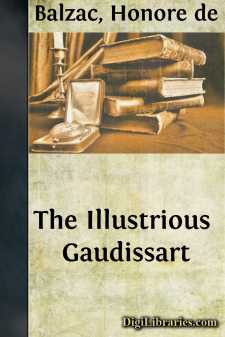Literary Collections
- American 84
- Ancient, Classical & Medieval 14
- Asian 1
- Australian & Oceanian 1
- Canadian 55
- Continental European
- English, Irish, Scottish, Welsh 179
- Essays 160
- General 24
- Letters 46
- Middle Eastern 1
Continental European Books
Sort by:
by:
Honore de Balzac
A PRINCE OF BOHEMIA "My dear friend," said Mme. de la Baudraye, drawing a pile of manuscript from beneath her sofa cushion, "will you pardon me in our present straits for making a short story of something which you told me a few weeks ago?" "Anything is fair in these times. Have you not seen writers serving up their own hearts to the public, or very often their mistress' hearts...
more...
by:
Honore de Balzac
CHAPTER I There is a house at Douai in the rue de Paris, whose aspect, interior arrangements, and details have preserved, to a greater degree than those of other domiciles, the characteristics of the old Flemish buildings, so naively adapted to the patriarchal manners and customs of that excellent land. Before describing this house it may be well, in the interest of other writers, to explain the...
more...
by:
Theodor Fontane
THE LIFE OF GUSTAV FREYTAG By ERNEST F. HENDERSON, PH.D., L.H.D. Author of A History of Germany in the Middle Ages; A Short History ofGermany, etc. It is difficult to assign to Gustav Freytag his exact niche in the hall of fame, because of his many-sidedness. He wrote one novel of which the statement has been made by an eminent French critic that no book in the German language, with the exception of...
more...
by:
Honore de Balzac
I. THE SAUVIATS In the lower town of Limoges, at the corner of the rue de la Vieille-Poste and the rue de la Cite might have been seen, a generation ago, one of those shops which were scarcely changed from the period of the middle-ages. Large tiles seamed with a thousand cracks lay on the soil itself, which was damp in places, and would have tripped up those who failed to observe the hollows and ridges...
more...
by:
Honore de Balzac
CHAPTER I The commercial traveller, a personage unknown to antiquity, is one of the striking figures created by the manners and customs of our present epoch. May he not, in some conceivable order of things, be destined to mark for coming philosophers the great transition which welds a period of material enterprise to the period of intellectual strength? Our century will bind the realm of isolated...
more...
by:
Edward Dowden
PREFACE French prose and French poetry had interested me during so many years that when Mr. Gosse invited me to write this book I knew that I was qualified in one particular—the love of my subject. Qualified in knowledge I was not, and could not be. No one can pretend to know the whole of a vast literature. He may have opened many books and turned many pages; he cannot have penetrated to the soul of...
more...
by:
Oliver C. Colt
Introduction. The tale of Tartarin de Tarascon was written by Alphonse Daudet in 1872, and was one of the many works which he produced. In it he pokes gentle fun at a type of Frenchman who comes from the Midi, the area where he himself was born. Tartarin has characteristics which may remind the English-speaking reader of Toad of Toad Hall, a boastful braggart, easily deceived, but good-hearted au fond....
more...
by:
William Painter
INTRODUCTION. A young man, trained in the strictest sect of the Pharisees, is awakened one morning, and told that he has come into the absolute possession of a very great fortune in lands and wealth. The time may come when he may know himself and his powers more thoroughly, but never again, as on that morn, will he feel such an exultant sense of mastery over the world and his fortunes. That image seems...
more...
FRENCH LITERATURE. Of French literature, taken as a whole, it may boldly be said that it is, not the wisest, not the weightiest, not certainly the purest and loftiest, but by odds the most brilliant and the most interesting, literature in the world. Strong at many points, at some points triumphantly strong, it is conspicuously weak at only one point,—the important point of poetry. In eloquence, in...
more...
by:
Alfred de Musset
ALFRED DE MUSSET A poet has no right to play fast and loose with his genius. It does not belong to him, it belongs to the Almighty; it belongs to the world and to a coming generation. At thirty De Musset was already an old man, seeking in artificial stimuli the youth that would not spring again. Coming from a literary family the zeal of his house had eaten him up; his passion had burned itself out and...
more...











